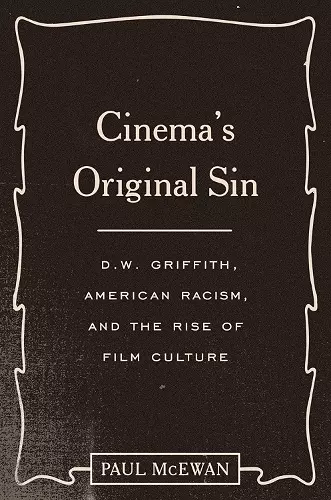Cinema's Original Sin
D.W. Griffith, American Racism, and the Rise of Film Culture
Format:Hardback
Publisher:University of Texas Press
Published:13th Dec '22
Should be back in stock very soon

For over a century, cinephiles and film scholars have had to grapple with an ugly artifact that sits at the beginnings of film history. D. W. Griffith’s profoundly racist epic, The Birth of a Nation, inspired controversy and protest at its 1915 release and was defended as both a true history of Reconstruction (although it was based on fiction) and a new achievement in cinematic art. Paul McEwan examines the long and shifting history of its reception, revealing how the film became not just a cinematic landmark but also an influential force in American aesthetics and intellectual life.
In every decade since 1915, filmmakers, museums, academics, programmers, and film fans have had to figure out how to deal with this troublesome object, and their choices have profoundly influenced both film culture and the notion that films can be works of art. Some critics tried to set aside the film’s racism and concentrate on the form, while others tried to relegate that racism safely to the past. McEwan argues that from the earliest film retrospectives in the 1920s to the rise of remix culture in the present day, controversies about this film and its meaning have profoundly shaped our understandings of film, race, and art.
Cinema’s Original Sin is a fascinating, authoritative, and essential text for anyone interested in film history, the history of racism and its on-going echoes, or examining the history of ongoing social conversations from the public, press, and academia...The Birth of a Nation is not a masterpiece. It’s well-executed propaganda. It’s time to call that out and acknowledge it, which Professor McEwan definitively does with flawless scholarship and inarguable logic. It’s an essential read and an essential contribution to numerous on-going cultural conversations. * Mastering Modernity *
Few films in the history of the medium have been as widely discussed as D. W. Griffith’s The Birth of a Nation...Yet it is this very excess of existing commentary that makes Paul McEwan’s contribution in the form of Cinema’s Original Sin so worthwhile and, ultimately, compelling...Tracing a long and contentious reception history that begins before cinema’s widespread acceptance as an art in its own right, McEwan delineates with rare authority how changing ideas about racism, artistic expression and film culture have been intertwined since the very earliest years of feature filmmaking in the United States. * Early Popular Visual Culture *
Alongside the history McEwan keeps track of how film criticism might contribute to and ameliorate the contours of white supremacy—film criticism that includes his book and now this little review. * CHOICE *
McEwan presents an enchanting and well-researched historical past . . . and argues that this controversy inside movie historical past has formed understandings of movie, race, and artwork. * Hetflix *
Cinema’s Original Sin is expansive, particularly for students who think of racism and the cinema solely in terms of representational strategies. Once it becomes clear that the issue is structural, adjusting representational strategies appears an insufficient solution to the issues that led—and in some instances continue to lead—to Griffith’s defense. * Film Quarterly *
ISBN: 9781477325483
Dimensions: 229mm x 152mm x 30mm
Weight: 513g
272 pages